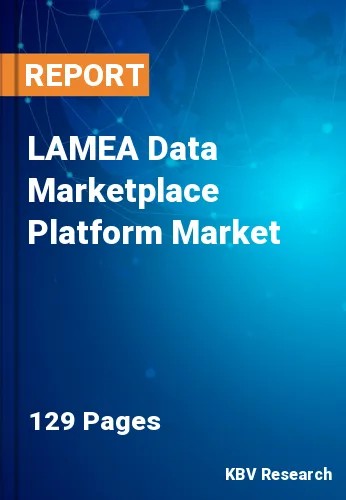The Latin America, Middle East and Africa Data Marketplace Platform Market would witness market growth of 31.8% CAGR during the forecast period (2022-2028).
On-site options for managing and analyzing data include data lakes and data warehouses. They are helpful for processing internal corporate data. The variety of data available in data marketplaces is wider. Depending on the marketplace users select, they can purchase any form of data, including customer behavior, financial, geolocation, and technological stack data. Due to their degree of data quality and metadata, data marketplaces supply data that is prepared for usage by a variety of organizations. Since they are kept for internal use only, internal datasets, like data warehouses may contain information that is more difficult to understand.
Marketplaces list data, identify its characteristics and explain how it might benefit consumers so that data scientists do not have to spend time on ETL procedures and can focus on learning from it. Web scraping is a method that automatically extracts data from websites. It automates data collecting, opens web data sources, and offers suggestions for data-driven decisions that improve decision-making. The use of self-service analytics tools and solutions is being accelerated by the growing adoption of data mesh, AI, data management, as well as blockchain within data & analytics. It offers access to or customization of analyses without technical expertise, allowing for an in-depth grasp of data analytics.
Like other countries, the South African economy is fast going digital. This implies that the majority of the services available on digital platforms will be accessed by consumers and citizens from both the public and private sectors using electronic devices. Government and commercial sector organizations are changing the way they deliver services, moving them online to give citizens and consumers secure access to the services whenever they need them, from any location and on any device. The delivery of economic efficiencies is increasingly dependent on the digital domain. Due to this, the adoption of data marketplace platforms is estimated to rise significantly within the public sector in the country, and hence, the growth of the regional market would flourish.
The Brazil market dominated the LAMEA Data Marketplace Platform Market by Country in 2021, and would continue to be a dominant market till 2028; thereby, achieving a market value of $73.8 million by 2028. The Argentina market is showcasing a CAGR of 32.5% during (2022 - 2028). Additionally, The UAE market would generate a CAGR of 31.4% during (2022 - 2028).
Based on Component, the market is segmented into Platform (without Services) and Services. Based on Type, the market is segmented into B2B, IoT and Personal. Based on Enterprise size, the market is segmented into Large Enterprises and SME's. Based on Revenue Model, the market is segmented into Subscription, Commission, Paid features and Others. Based on End-user, the market is segmented into Financial Services, Healthcare & Life Sciences, Advertising, Media & Entertainment, Retail & CPG, Technology, Public Sector, Manufacturing and Others. Based on countries, the market is segmented into Brazil, Argentina, UAE, Saudi Arabia, South Africa, Nigeria, and Rest of LAMEA.
Free Valuable Insights: The Global Data Marketplace Platform Market is Predict to reach $3.5 Billion by 2028, at a CAGR of 24.3%
The market research report covers the analysis of key stake holders of the market. Key companies profiled in the report include Amazon Web Services, Inc. (Amazon.com, Inc.), Oracle Corporation, SAP SE, Microsoft Corporation, Adobe, Inc., Snowflake, Inc., Nasdaq, Inc. (Quandl, Inc.), BattleFin, Narrative I/O, Inc., and Datarade GmbH.
By Component
By Type
By Enterprise size
By Revenue Model
By End-user
By Country
Our team of dedicated experts can provide you with attractive expansion opportunities for your business.

